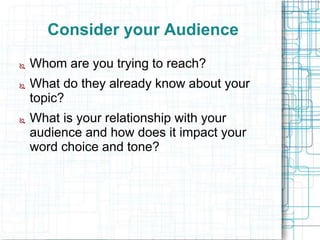Argumentative essay ppt
- 2. What is an Argumentative Essay? The purpose of an argumentative essay is to persuade the reader to accept—or seriously consider--your opinion on a controversial issue Has five parts: Thesis (Claim), Reasons, Evidence, Counterclaim, Rebuttal (plus Introduction and Conclusion)
- 3. Consider your Audience Whom are you trying to reach? What do they already know about your topic? What is your relationship with your audience and how does it impact your word choice and tone?
- 4. THESIS/CLAIM Your opinion or position on an issue Must be supported with reasons and evidence Evidence can include quotes, facts, and data Evidence MUST be explained
- 5. REASONS Your reasons support the thesis and form argument with your evidence. Typical supporting paragraph structure goes like this: topic sentence (A reason why your thesis is correct), then evidence/support of that reason. Finally, include an explanation of the evidence. Be sure to repeat a similar structure with every body paragraph
- 6. COUNTER CLAIM Consider the opposite side Argues against your claim Turn against your argument to challenge it Then turn back to reaffirm your position
- 7. REBUTTAL Turn back to your original position Responds to and refutes* issues presented by the counterclaim *Refute-prove (a statement or theory) to be wrong or false; disprove.
- 8. The Opposing Side Ask these questions: 1. Who might disagree with my position? Why? 2. What reasons do people have for disagreeing with me? 3. What evidence would support an opposing argument?
- 9. Counter Claim Key phrases to use: One might object that... It might seem that... It's true that... Admittedly... Of course...
- 10. EXAMPLE CLAIM: “More Americans are choosing low-carb diets because the media promotes low-carb diets as the new way to a skinnier body.” COUNTER CLAIM: “Some Americans don't watch television commercials because they own a DVR or Tivo, but most Americans are exposed to other forms of advertisement in magazines, newspapers, and highway billboards.
- 11. Where to put it? Introduction w/Thesis Reason 1 w/Evidence Reason 2 w/Evidence Counter Claim/Rebuttal Conclusion w/Restated Thesis Each of these will be one paragraph!










